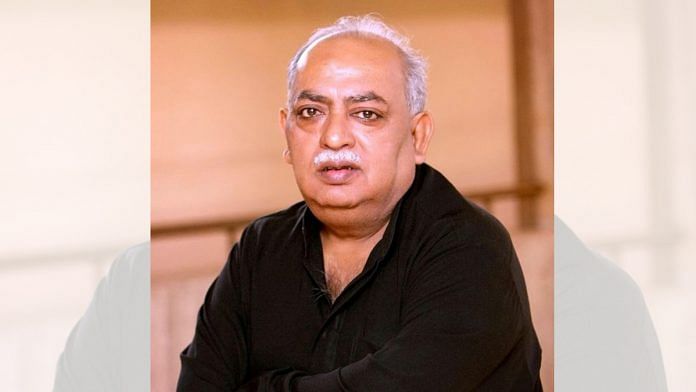New Delhi: Munawwar Rana’s shayaris were never complete without mothers, tears, and handkerchiefs. I discovered the poet as a college student when I was exploring the world of Urdu.
The poet, who was battling throat cancer, died at the age of 71 on 14 January. Now, I’m transported to the times when I got to see him perform in Delhi. He usually always wore black. His eyes would tear up as he recited the shayaris. But he came prepared. He would wipe the tears away with the handkerchief clutched in his hand. That was Munnawar Rana for me.
In mushairas, when other poets would recite sher for lovers, loneliness and patriotism, Munawwar Rana used to steal the show with sher-like couplets dedicated to the mother.
“Kisi ko ghar mila hisse mein ya koi dukan aayi, main ghar mein sabse chhota tha mere hisse mein maa aayi” (Some got the home while some got the shop, I was the youngest so I got the mother).
Rana’s poem titled ‘Maa’ is considered one of his most famous works. His poetry celebrated a mother’s love. ‘Munawwar Rana’ always trends on Mother’s Day, when social media platforms are flooded with his shers. People post photographs with their mothers and caption them with his couplets. “Iss tarah mere gunahon ko vo dho deti hai, Maa bahut guess mein hoti hai to ro deti hai” (“In this manner, she washes away my sins; When my mother is very angry, she weeps.”)
He was celebrated internationally for his shayaris, having performed in Dubai, London and other parts of the world. But he always used simple words, which is what made his poems widely popular.
Born in 1952 in Uttar Pradesh’s Rae Bareli, Rana was conferred with Sahitya Akademi Award, Jnanpith Award, Amir Khusro Award, Mir Taqi Mir Award, Ghalib Award, Dr Zakir Hussain Award, and Saraswati Samaj Award.
Over the years, he courted controversy and arrest —he compared Valmiki to the Taliban, questioned former chief justice of India Ranjan Gogoi over the Ram Mandir verdict, and returned his Sahitya Akademi Award. A lot of his fans turned against him, and many of his friends stopped talking to him.
It didn’t stop the poet from voicing his thoughts—winning a popularity contest did not interest him. But in death, even his critics have come out to acknowledge his craft and contribution to poetry.
मुनव्वर राना नहीं रहे। उनके जीवन के आख़री दशक में उनसे गम्भीर मतभेद रहे। किंतु कवि-सम्मेलनीय यात्रा के शुरुआती दौर में मंचों पर उनके साथ काफ़ी वक्त बीता। उन तमाम यादों के साथ उन्हें श्रद्धांजलि सहित ईश्वर से प्रार्थना कि उनके परिजनों को शक्ति प्रदान करे । ॐ शांति ॐ 🙏
— Dr Kumar Vishvas (@DrKumarVishwas) January 15, 2024
I don’t think I can attend a mushaira and not think of Munawwar Rana—the poet who made the audience cry with him. Now when he is resting in peace, these are the lines that keep coming to me.
“Mitti ka badan kar diya mitti ke hawale, mitti ko kahin Taj Mahal mein nahi rakha” (I entrusted my body to the soil, I did not keep the soil in a Taj Mahal).
Views are personal.



